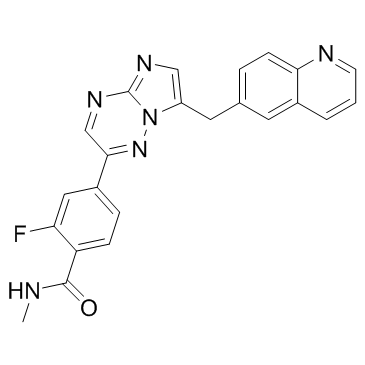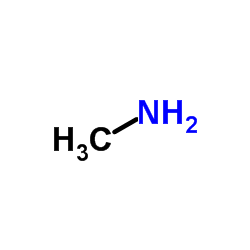1029712-80-8
| Name | 2-fluoro-N-methyl-4-[7-(quinolin-6-ylmethyl)imidazo[1,2-b][1,2,4]triazin-2-yl]benzamide |
|---|---|
| Synonyms |
2-fluoro-N-methyl-4-[7-(quinolin-6-ylmethyl)-imidazo[1,2-b][1,2,4]triazin-2-yl]benzamide
2-fluoro-N-methyl-4-[7-(quinolin-6-ylmethyl)imidazolo[1,2-b][1,2,4]triazin-2-yl]benzamide cc-219 Benzamide Capmatinib QC-7530 UNII-TY34L4F9OZ 2-fluoro-N-methyl-4-[(7-quinolin-6-ylmethyl)imidazo[1,2-b]triazin-2-yl]benzamide 2-Fluoro-N-methyl-4-[7-(6-quinolinylmethyl)imidazo[1,2-b][1,2,4]triazin-2-yl]benzamide INC-280 2-fluoro-N-methyl-4-{7-[(quinolin-6-yl)methyl]imidazo[1,2- b][1,2,4]triazin-2-yl}benzamide INCB28060 2-Fluoro-N-methyl-4-[7-[(quinolin-6-yl)methyl]imidazo[1,2-b]-[1,2,4]triazin-2-yl]benzamide |
| Description | Capmatinib (INCB28060) is a potent and selective c-MET kinase inhibitor. Capmatinib (INCB28060) inhibits c-MET kinase activity with an average IC50 of 0.13 nM. |
|---|---|
| Related Catalog | |
| Target |
IC50: 0.13 nM (c-MET)[1] |
| In Vitro | Capmatinib (INCB28060) inhibits c-MET phosphorylation with an IC50 value of approximately 1 nM and a concentration of approximately 4 nM inhibits c-MET more than 90%. Capmatinib (INCB28060) inhibits SNU-5 viability or proliferation with an average IC50 value of 1.2 nM and a calculated IC90 value of 4.6 nM Capmatinib (INCB28060) prevents HGF-stimulated H441 cell migration, with IC50 of approximately 2 nM. Again, there is little cell migration at a concentration of 16 nM Capmatinib (INCB28060). Capmatinib (INCB28060) potently and specifically inhibits c-MET enzyme activity, c-MET-mediated signal transduction, and the c-MET-dependent neoplastic phenotype of tumor cells. Capmatinib (INCB28060) exhibits strong antitumor activity in c-MET-dependent tumor models at well-tolerated doses. Capmatinib (INCB28060) exhibits picomolar enzymatic potency and is highly specific for c-MET with more than 10,000-fold selectivity over a large panel of human kinases. Capmatinib (INCB28060) potently inhibits c-MET-dependent tumor cell proliferation and migration and effectively induces apoptosis[1]. |
| In Vivo | Oral dosing of Capmatinib (INCB28060) results in time- and dose-dependent inhibition of c-MET phosphorylation and tumor growth in c-MET-driven mouse tumor models, and the inhibitor is well tolerated at doses that achieve complete tumor inhibition. Furthermore, once daily dosing of 10 mg/kg Capmatinib (INCB28060) results in partial regressions in 6 of 10 U-87MG tumor-bearing mice. It is noted that in both S114 and U-87MG models, tumor growth inhibition increases with increased exposure of the compound and that tumor regressions could only be achieved when the compound exposure consistently exceeded 90% of c-MET inhibition. In these studies, Capmatinib (INCB28060) is well tolerated at all doses during the treatment periods, with no evidence of overt toxicity or weight loss[1]. |
| Cell Assay | Optimal cell density used in the viability assay is predetermined for individual cell lines. To determine compound potency, cells are seeded into 96-well microplates at the appropriate density in media containing 1% to 2% FBS and supplemented with serial dilutions of Capmatinib (INCB28060) in a final volume of 100 μL per well. After 72 hour incubation, 24 μL of CellTiter 96 AQueous One Solution is added to each well, and the plates are incubated for 2 hours in a 37°C incubator. The optical density is measured in the linear range using a microplate reader at 490 nm with wavelength correction at 650 nm. IC50 values are calculated using the GraphPad Prism Software[1]. |
| Animal Admin | Mice[1] Tumor-bearing mice are dosed orally, twice each day with 1, 3, 10, or 30 mg/kg of free base Capmatinib (INCB28060) reconstituted in 5% DMAC in 0.5% methylcellulose for up to 2 weeks. Body weights are monitored throughout the study as a gross measure of toxicity/morbidity. Tumor growth inhibition, expressed in percent, is calculated using the formula: (1−[(volume (treated)/volume (vehicle)])×100. |
| References |
| Density | 1.4±0.1 g/cm3 |
|---|---|
| Molecular Formula | C23H17FN6O |
| Molecular Weight | 412.419 |
| Exact Mass | 412.144775 |
| PSA | 88.56000 |
| LogP | -0.12 |
| Index of Refraction | 1.717 |
| Storage condition | 2~8℃ |
| Hazard Codes | Xi |
|---|
|
~84% 
1029712-80-8 |
| Literature: Weng, Lingkai; Qiao, Lei; Zhou, Jiacheng; Liu, Pingli; Pan, Yongchun Patent: US2009/291956 A1, 2009 ; Location in patent: Page/Page column 24-25 ; |
| Precursor 1 | |
|---|---|
| DownStream 0 | |

